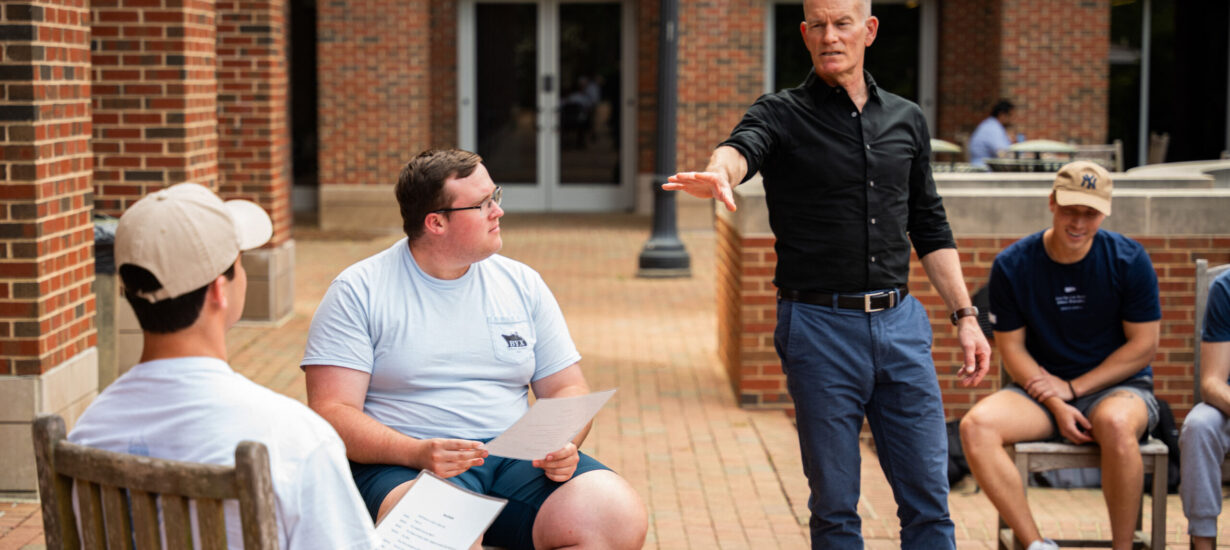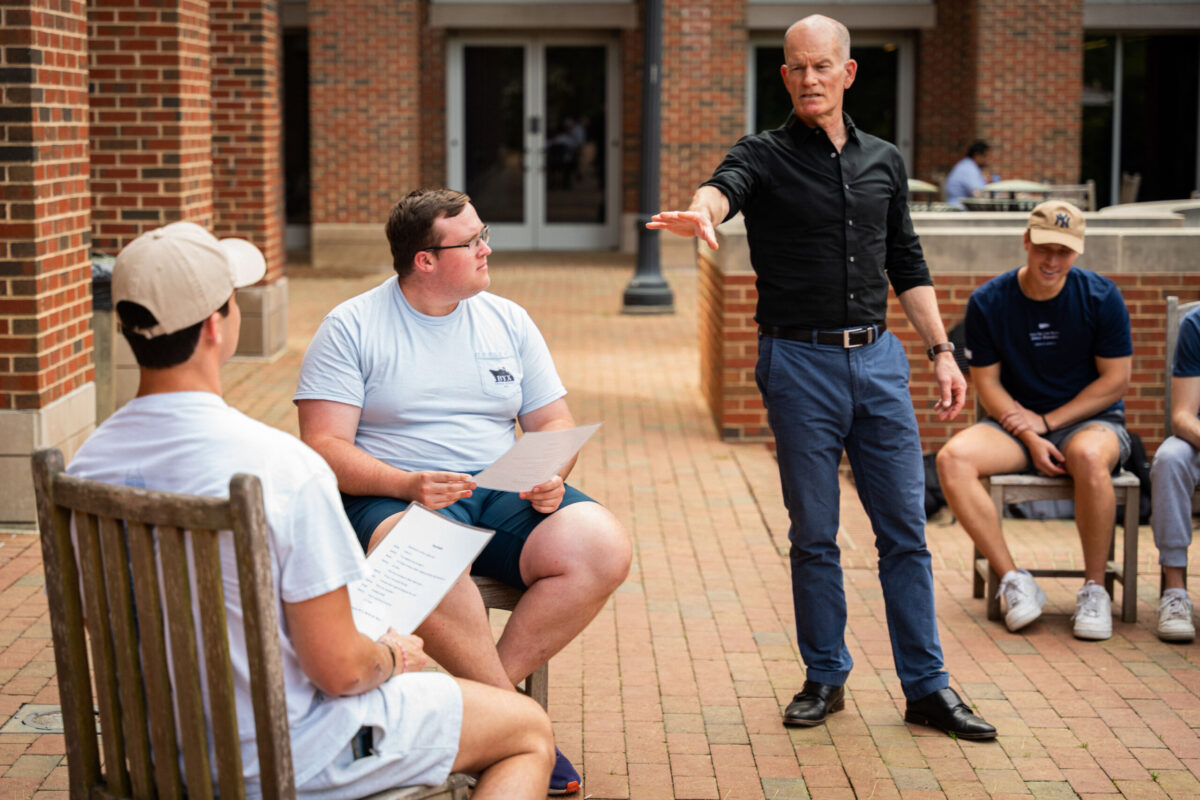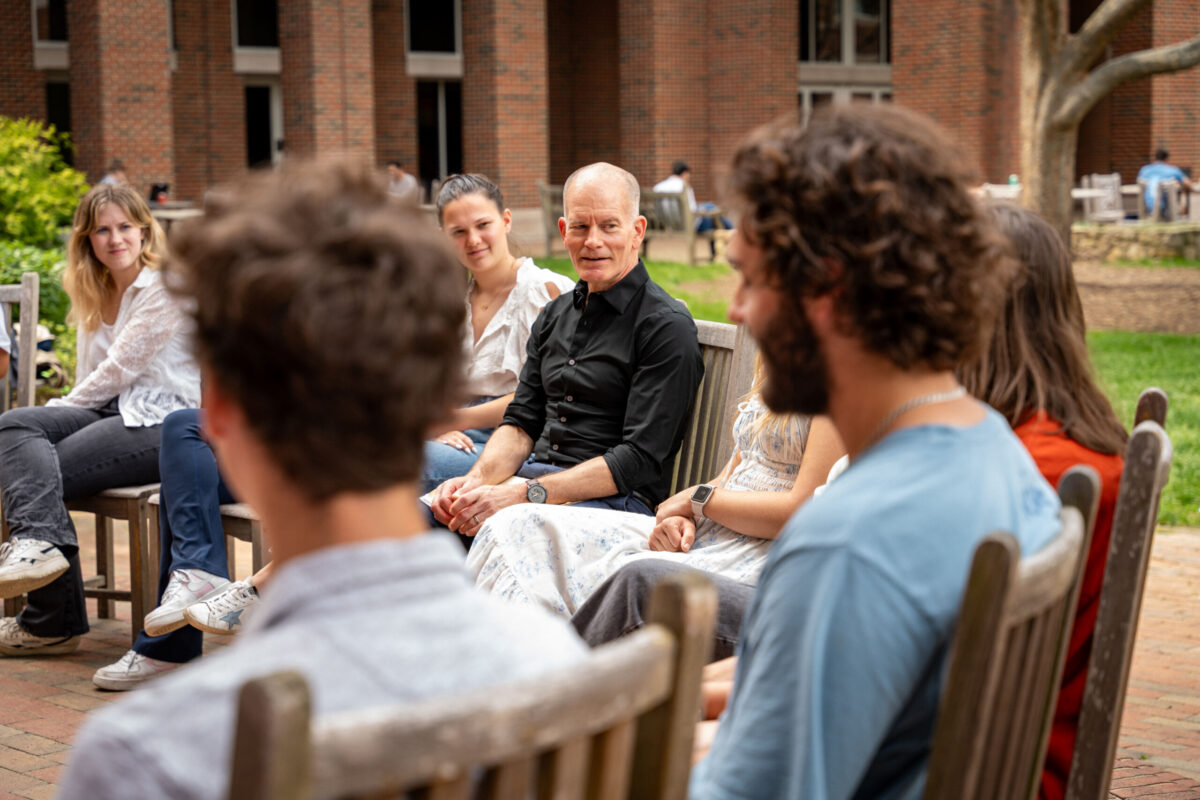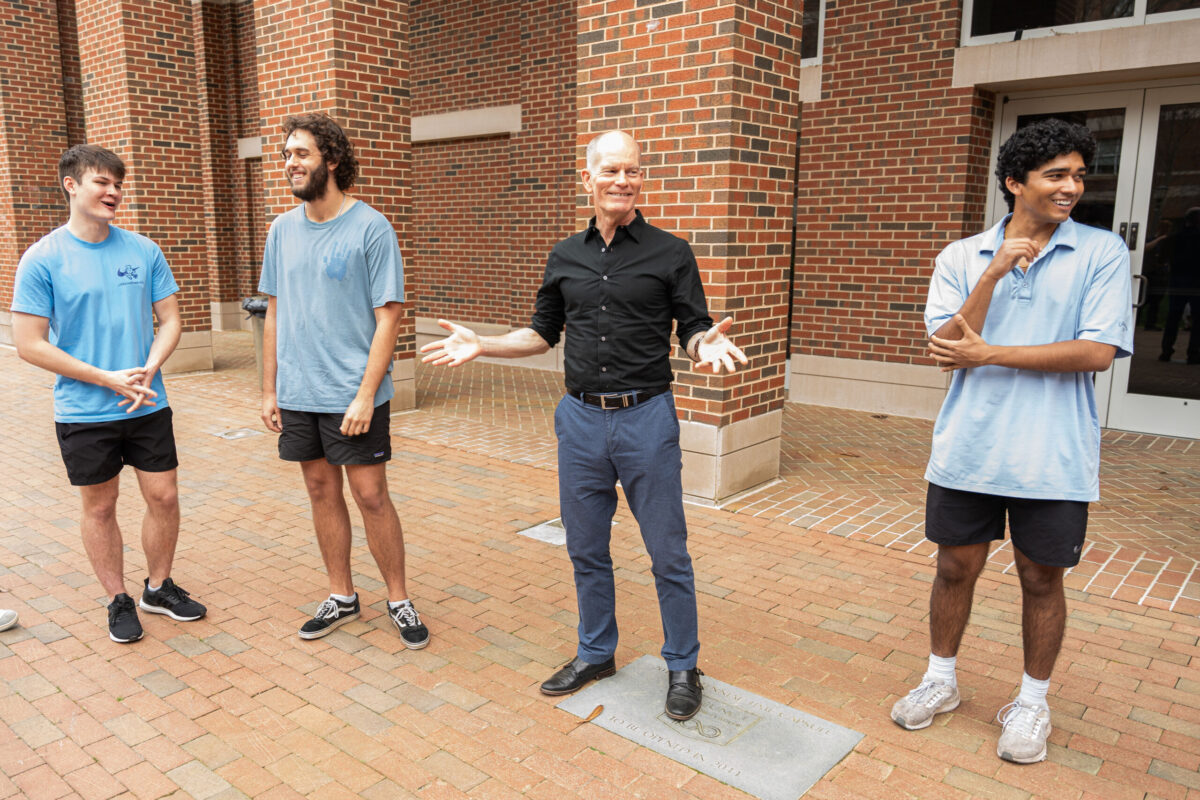Improv Meets the Boardroom


For nearly 25 years, Greg Hohn ’85 has used improv to teach business majors how to be authentic and versatile in the corporate world. (Photo: Carolina Alumni/Cory Dinkel)
Peek into Greg Hohn’s classroom at Kenan-Flagler Business School on any given day, and more likely than not, it will be the students — not Hohn — who are front and center.
Hohn ’85 teaches graduate- and undergraduate-level applied improv classes that have much more in common with Saturday Night Live than with anything related to profits, losses or returns on investments.
Hohn’s goal for the past 24 years has been to teach his students to be authentic, think on their feet and adapt to ever-changing workforce needs — and based on feedback from his crew of Not Ready for Primetime Players, it’s a task at which he excels.
“I’ve taken a lot of classes,” said Rohun Shah ’19, who graduated from UNC with a bachelor’s degree in political science and psychology and a minor in business. Hohn’s class tops the list, he said. “I’ve never had a class like that,” said Shah, who later received a law degree and an MBA at Wake Forest University. “It’s been the most practical and applicable to most areas of life.”
Now a commercial litigation attorney with Poyner Spruill LLP in Charlotte, Shah said Hohn taught him the magic of “yes, and,” a core principle of improv in which actors build on what their scene partners say and do instead of detracting from it or even bringing it to a screeching halt. “We’re accepting the other person’s idea,” Hohn said, “and then adding to it rather than resisting it or trying to control it.”
That dexterity is an aptitude Shah’s applied to almost any setting, including a courtroom. It’s helped him to one-up the opposition but not in a condescending way, he said. It also works with his fiancée. “If I take the ‘yes, and’ approach, things get resolved more quickly, because I’m not invalidating her thoughts and her feelings,” he said.
Improv’s reach
Hohn graduated from Carolina with an English degree and then worked as a newspaper reporter and editor and later a community college administrator before circling back to Chapel Hill. In 1989, on a whim, Hohn auditioned for the Transactors Improv Co., now the Actors Improv Theater, and he was asked to join. He thought, “All right, I’m going to be an actor.” Hohn is now the director of Actors Improv, and apart from a brief stint in Los Angeles, he’s been in Chapel Hill ever since.
By the late 1990s, he had developed a curriculum for teaching improv in a theatrical setting, and it was feedback from his students that made him realize improv had applications far beyond the stage. “Students would tell me how they had used what they learned in improv at work and at home, giving a presentation, in a meeting, talking to clients, with their kids, and resolving conflicts,” he said.

Greg Hohn ’85 (center) is the director of the Actors Improv Theater and an assistant professor at UNC Kenan-Flagler Business School. (Photo: Carolina Alumni/Cory Dinkel)
The curriculum Hohn developed is now the foundation for a popular and hard-to-get course at Kenan-Flagler Business School — Applied Improvisation for Business Communication — at the graduate and undergraduate levels.
Hohn started the class in fall 2000, when no other MBA school had such a program. The class was immediately oversubscribed, surprising some administrators, and a second class was created that semester. “There’s been a new way of looking at education over the past few decades, of learning a new way,” Hohn told the Review in 2001 to explain the course. “It’s like the medical school doing play readings to help students develop greater empathy through artistic sublimation. It’s outward bound, but inward bound; a rope course without the rope burn — an intensive course that’s going to teach you something.” (See “What’s His Line,” September/October 2001 Review.)
Now, Hohn teaches seven classes of applied improv, four in the fall semester and three in the spring. A must-read for the course is his appropriately named book, Putting Improv to Work.
All gas, no brakes
Shah is one of many who still gush years later about Hohn’s class and the ripple effect it’s had on their lives and careers. Ashwin Ramamurthy ’18 (MBA), who enrolled in Kenan-Flagler’s MBA program after spending eight years in the oil and gas industry, said the class taught him to be authentic, a quality that’s proven to be a big plus as he increasingly takes on leadership roles in the strategic marketing division at Eastman Chemical Co., a specialty materials company that makes, among other things, tints for automobile windows and paint protection products. “Leaders don’t always tell you what to do,” he said. “They share their opinion and will be confident that their opinion is backed up instinctively by what they know and what they’ve seen that works.”
Ramamurthy learned this lesson in a way that would be hard to come by in a typical business school setting. In one exercise during the class he took in fall 2017, he pretended to eat something. He no longer remembers what, but he used the example of a candy bar. Ramamurthy’s approach was to ham it up and exaggerate every step as if he were as eager as a kid in a candy store — unwrapping the imaginary candy bar and hastily taking one bite after another. But he learned that authenticity was more effective by watching a fellow student who chose to eat an imaginary bowl of cereal more realistically — without overacting. “It is impressive what he [Hohn] was able to get a bunch of MBA students to do,” Ramamurthy said, noting that the lesson learned was so impactful, he distinctly remembers the imaginary bowl of cereal better than his fictitious food choice.

“We’re accepting the other person’s idea,” Hohn said, “and then adding to it rather than resisting it or trying to control it.” (Photo: Carolina Alumni/Cory Dinkel)
For Laura Hanson ’15, the business school’s improv class was a boot camp in agility, and if there’s a trait her job requires more than any other, it’s the ability to adapt to any situation. Hanson is part of the leadership communications team at Ernst & Young, one of the world’s largest auditing and consulting firms, where learning to trust her instincts, take calculated risks and read the room are key. “Greg’s class,” she said, “was a great refresher of what it means to feel competent and showing up authentically and then trusting your intuition and your own innate abilities and skills.”
Hanson’s earlier experience with public speaking competitions, theater productions and volleyball matches gave her a strong foundation, she said, but those skills were very much reinforced in Hohn’s class. “He’s a rare embodiment of the sense of play and wonder that we often lose as the world shapes us into what society expects us to be,” she said.
Hohn’s penchant for tapping into a sense of play has a lot to do with FIZ, aka the F***-It-Zone, a jumping off point between comfort and discomfort. As he explains in Putting Improv to Work, FIZ is the “gateway to infinity, the limitlessness of yes.”
In his book — as in his work — Hohn encourages anyone and everyone to get out of their comfort zones. “I want them to risk appearing foolishly enthusiastic about seemingly inconsequential things like cookies or shoes,” he writes, “so that they can bring that same fervor to truly important things like justice, love, and their dreams.”
If Hohn’s students had their say, his “all-gas-and-no-brakes” approach — the FIZ, if you will — would be a requirement to graduate. “It was the best class that UNC had to offer,” said investment banker Remy Borinsky ’23 (MBA). “It’s the one class that I constantly put into action every day.”
Borinsky, once a college soccer player with aspirations of going pro, said before Hohn, before improv, before FIZ, “everything was either a win or a loss to me.” Now, she said, “I’m trying to really learn from each experience.”
— Lucy Hood ’83
Thanks for reading the Carolina Alumni Review
Carolina Alumni members, sign in to continue reading.
Not yet a member? Become one today.
